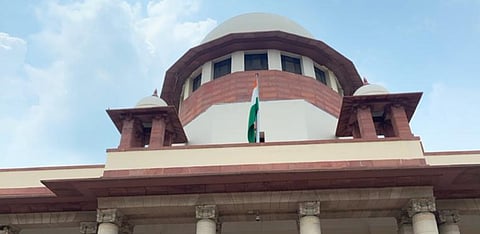

The petitions contend that the laws are in violation of fundamental values such as secularism, fraternity, dignity and privacy. The court will now hear the matter on March 17.
—-
THE Supreme Court on Friday issued a notice on four writ petitions challenging the anti-conversion laws enacted by Uttar Pradesh, Madhya Pradesh, Gujarat, Himachal Pradesh, Uttarakhand, Jharkhand, Haryana and Karnataka which inter alia seek to prohibit religious conversion by marriage and make it mandatory to give notice of conversion to state authorities.
A division bench comprising Chief Justice of India (CJI) Dr. D.Y. Chandrachud and Justice P.S. Narasimha issued the notice to the respective state governments and the Union Government to this effect. These petitions have been filed by Jamiat Ulama-i-Hind Gujarat, Citizens For Justice And Peace, Peoples Union For Civil Liberties and the National Federation Of Indian Women.
Attorney General for India R. Venkataramani opposed the transfer petitions, and submitted that the respective high courts be let to hear the matters. The Supreme Court bench, however, proceeded to issue the notice, directing the state governments to file counter affidavits within three weeks.
It is the common ground of the petitioners challenging these state legislation that the said laws violate fundamental values such as secularism, fraternity, dignity and privacy.
The bench also issued notice on a transfer petition filed by journalist and activist L.S. Herdeniya seeking the transfer of his petition challenging Madhya Pradesh's Freedom of Religion Act, 2021 to the Supreme Court. It has also issued notice on a transfer petition filed by Jamiat Ulama-i-Hind Gujarat seeking to transfer all the petitions pending at the different high courts challenging the respective state legislation to the Supreme Court.
The bench will now hear the matter on March 17.
Besides the writ petitions challenging the statutes, two appeals, filed by the state governments of Madhya Pradesh and Gujarat respectively, challenging the interim orders passed by the respective high courts partially interdicting anti-conversion laws, are also pending before the Supreme Court.
The bench also heard the petition filed by Bharatiya Janata Party leader and advocate Ashwini Upadhyay seeking directions to the Union Government and state governments to take steps to prevent forced religious conversion by intimidation, threats or the lure of gifts and monetary benefits.
It permitted Upadhyay to withdraw the additional affidavit which contained defamatory averments against certain minority communities. Appearing for Upadhyay, senior advocate Arvind Datar contended that the Indian Penal Code had no provision to deal with forceful religious conversion. He argued that the matter be referred to the Law Commission of India. The bench, however, appeared unimpressed with the submission and remarked: "Why should we ask Law Commission to examine the issue? If Law Commission has to do it, they will do it."
Last month, the Supreme Court had admonished Upadhyay for keeping filing public interest litigation (PIL) on issues on which he had previously filed petitions, but had chosen to withdraw them, when the court had not granted him liberty to file a petition afresh.
"It seems that PIL petitioners don't think they're bound by rules of pleadings. You cannot keep on withdrawing and filing new petitions,"CJI Dr. Chandrachud had remarked.
The CJI's observations were in contrast to the observations made in November last year by a division bench headed by Justice M.R. Shah that had been hearing Upadhyay's petition until now. The Justice Shah-led bench had verbally overruled the objections raised by interveners that Upadhyay's petition was not maintainable as a similar petition had been withdrawn by him or had been dismissed by the court. Instead, the bench had observed that the issue of forced religious conversion was a serious matter which affected national security as well as the freedom of conscience of an individual.